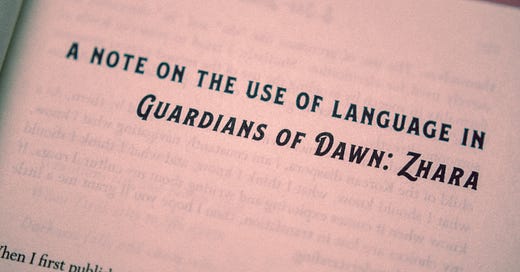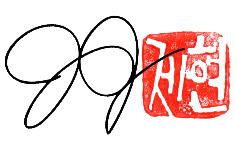The Morning Realms Dispatch No. 10
A note on the use of language in GUARDIANS OF DAWN: ZHARA
Dear friends,
We are LESS THAN ONE MONTH AWAY from the release of Zhara. What the fuck. I mean what the actual fuck. Anyway, for this month’s Morning Realms Dispatch, I am reproducing the author’s note at the beginning of the book so that it may be more widely shared. I tried to be as thoughtful as I could about the choices I made, and hope they will make readers linger just a little longer on imagining how people of other cultures may relate to the world.
Also, if you’ve preordered the book, thank you, thank you, thank you. As a reminder, you can upload your receipts at the link below and receive a cool swag pack! Open to US/CAN and while supplies last.
When I first published Wintersong, I had a reader ask me why I had chosen to set my debut novel in eighteenth-century Bavaria instead of an Asian country. Back then, I had a glib answer for everything, and I believe I said something to the effect that I wouldn’t have written about classical music if it hadn’t been for my Asian mother putting me through piano lessons when I was four. Yet the true answer to this reader’s question was that I hadn’t yet developed the skills to navigate how to convey cultural norms in English—and to a Western audience—without resorting to clunky exposition or alienating a reader unfamiliar with Asian social context or philosophy. There is always a fine line to walk between letting my audience figure things out for themselves and holding their hands, and I elected for the former in Guardians of Dawn: Zhara.
When writing a fantasy world not inspired by a Western country, I always into the problem of translation. Do I use the word hanfu or hanbok or kimono, or elect to use robe instead? Would a word like boudoir make sense when the idea of the French language doesn’t even exist? The land of the Morning Realms is inspired by East Asia, and while there is no one-to-one direct correlation between existing cultures and languages, the one thing I tried to carry over from languages like Chinese and Korean was the fact that there is no gendered third-person pronoun. As such, all characters are referred to with the ungendered third-person pronoun “they” until they explicitly gender themselves. The use of pronouns like “she” and “he” thereafter are merely used for clarification. Similarly, I tried to preserve levels of formality in speech by avoiding the use of the second-person pronoun “you” until the character is granted explicit permission to address someone directly.
In the end, I made choices with the text and I stand by them. As a child of the Korea diaspora, I am constantly navigating what I know, what I should know, what I think I know, and what I think I should know when it comes to exploring and writing about my cultural roots. If my choices are lost in translation, then I hope you’ll grant me a little grace and understanding.





